

Merkel: Oekraïne is een dictatuur vergelijkbaar met Wit-Rusland. Buitenland De Duitse bondskanselier Angela Merkel heeft hard uitgehaald naar de regering van Oekraïne, één van de twee gastlanden van het EK Voetbal volgende maand.
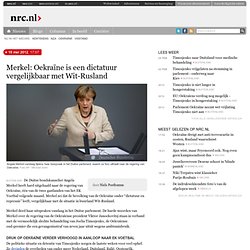
Merkel zei dat de bevolking van de Oekraïne onder “dictatuur en repressie” leeft, vergelijkbaar met de situatie in buurland Wit-Rusland. Merkel deed haar uitspraken vandaag in het Duitse parlement. De harde woorden van Merkel over de regering van de Oekraïense president Viktor Janoekovitsj staan in verband met de vermoedelijk slechte behandeling van Joelia Timosjenko, de Oekraïense oud-premier die een gevangenisstraf van zeven jaar uitzit wegens ambtsmisbruik. Druk op Oekraïne verder verhoogd in aanloop naar EK Voetbal De politieke situatie en detentie van Timosjenko zorgen de laatste weken voor veel ophef. Merkel lijkt dus vandaag de druk nog wat verder op te voeren. Merkel verhoogt de druk. Duitsland wil Timosjenko behandelen - afgewezen door Kiev Lees meer over: Aleksandr Loekasjenko Angela Merkel dictatuur EK voetbal Oekraïne.
Oekraïne schrapt top na massale boycot. Een man zit een tent met aanhangers van de gevangengenomen oud-premier Joelia Timosjenko in Kiev.
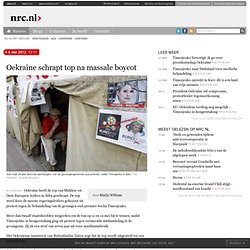
Foto Reuters / Anatolii Stepanov Buitenland Oekraïne heeft de top van Midden- en Oost-Europese leiders in Jalta geschrapt. De top werd door de meeste regeringsleiders geboycot uit protest tegen de behandeling van de gevangen oud-premier Joelia Timosjenko. Meer dan twaalf staatshoofden weigerden om de top op 11 en 12 mei bij te wonen, nadat Timosjenko in hongerstaking ging uit protest tegen vermeende mishandeling in de gevangenis. Het Oekraïense ministerie van Buitenlandse Zaken zegt dat de top wordt uitgesteld tot een later tijdstip. Oekraïne staat onder zware westerse druk door de gevangenneming en de vermeende mishandeling van Timosjenko, de belangrijkste rivaal van president Viktor Janoekovitsj. Lees meer over: Jalta joelia timosjenko. Dochter Timosjenko komt naar Duitsland. Timosjenko overgebracht naar ziekenhuis in Charkov. Foto Reuters Buitenland.
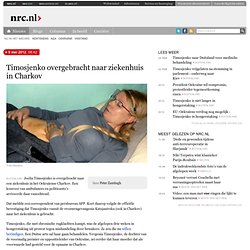
Wel naar China, maar nu niet naar Oekraïne? Hypocriet. De Nederlandse Publieke Omroep maakt gebruik van cookies.
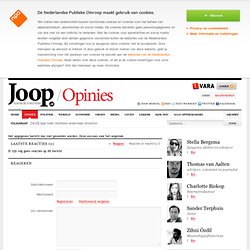
We maken een onderscheid tussen functionele cookies en cookies voor het beheer van webstatistieken, advertenties en social media. Shell sluit contract schaliegas met Oekraïne. AMSTERDAM – Olieconcern Shell en Chevron zijn door de Oekraïne aangewezen om twee omvangrijke schaliegasvelden in het land te gaan ontwikkelen.
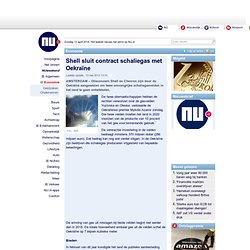
Hele Europese Commissie mijdt Oekraïne. Orange Revolution. The Orange Revolution (Ukrainian: Помаранчева революція, Pomarancheva revolyutsiya) was a series of protests and political events that took place in Ukraine from late November 2004 to January 2005, in the immediate aftermath of the run-off vote of the 2004 Ukrainian presidential election which was claimed to be marred by massive corruption, voter intimidation and direct electoral fraud.
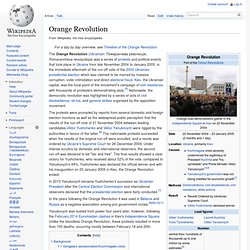
Kiev, the Ukrainian capital, was the focal point of the movement's campaign of civil resistance, with thousands of protesters demonstrating daily.[5] Nationwide, the democratic revolution was highlighted by a series of acts of civil disobedience, sit-ins, and general strikes organised by the opposition movement. In 2010 Yanukovych became Yushchenko's successor as Ukrainian President after the Central Election Commission and international observers declared that the presidential election were fairly conducted.[7] Background[edit] Gongadze assassination/Kuchmagate crisis[edit] Pora! Otpor! Otpor!
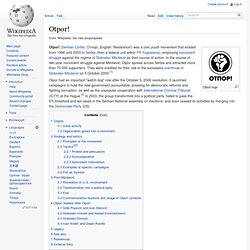
Logo Origins[edit] Initial activity[edit] An Otpor! Membership signup recruitment slip from the movement's early days. United States Agency for International Development. The United States Agency for International Development (USAID) is the United States federal government agency primarily responsible for administering civilian foreign aid.
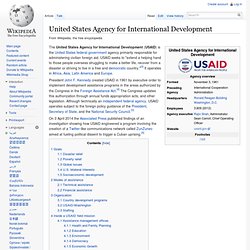
USAID seeks to "extend a helping hand to those people overseas struggling to make a better life, recover from a disaster or striving to live in a free and democratic country. United States Department of State. The United States Department of State (DoS),[3] often referred to as the State Department, is the United States federal executive department responsible for international relations of the United States, equivalent to the foreign ministry of other countries.
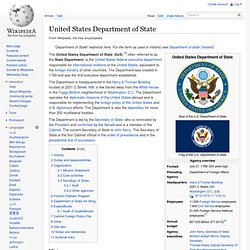
The Department was created in 1789 and was the first executive department established. The Department is headquartered in the Harry S Truman Building located at 2201 C Street, NW, a few blocks away from the White House in the Foggy Bottom neighborhood of Washington, D.C. Gene Sharp. Gene Sharp (born January 21, 1928) is the founder of the Albert Einstein Institution, a non-profit organisation dedicated to advancing the study of nonviolent action, and Professor Emeritus of political science at the University of Massachusetts Dartmouth.[3] He is known for his extensive writings on nonviolent struggle, which have influenced numerous anti-government resistance movements around the world.
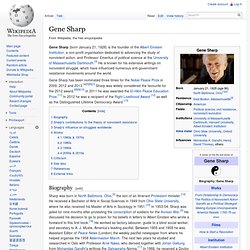
Gene Sharp has been nominated three times for the Nobel Peace Prize in 2009, 2012 and 2013.[4][5][6][7] Sharp was widely considered the favourite for the 2012 award.[8][9][10] In 2011 he was awarded the El-Hibri Peace Education Prize.[11] In 2012 he was a recipient of the Right Livelihood Award [12] as well as the Distinguished Lifetime Democracy Award.[13] Biography[edit] Sharp has been a professor of political science at the University of Massachusetts Dartmouth since 1972.
Sharp's contributions to the theory of nonviolent resistance[edit] Sharp's influence on struggles worldwide[edit] Freedom House. As of 2010, grants awarded from the US government accounted for most of Freedom House's funding;[5] the grants were not earmarked by the government but allocated through a competitive process. The organization is directed by David J. Kramer, former head of the Bureau of Democracy, Human Rights, and Labor of the United States Department of State. History[edit] Freedom House was founded in October 1941. Among its founding members were George Field, Dorothy Thompson, Wendell Willkie, Herbert Agar, Herbert Bayard Swope, Ralph Bunche, Father George B. National Democratic Institute for International Affairs. Logo of the NDIFIA The National Democratic Institute for International Affairs (NDI) is an organization created by the United States government by way of the National Endowment for Democracy (NED) to channel grants for furthering democracy in developing nations.
It was founded in 1983, shortly after the U.S. Congress created the National Endowment for Democracy.[1] Taxpayer funding is provided by the Federal Government, both directly from the United States Agency for International Development and the Department of State and indirectly through the National Endowment for Democracy. Additional funds are raised through voluntary donations from foreign governments, multilateral institutions, and private foundations.[2] It is headquartered in Washington, D.C.
International Republican Institute. Founded in 1983, the International Republican Institute (IRI) is an organisation, funded by the United States government, that conducts international political programs, sometimes called 'democratization programs'.[2] Initially known as the National Republican Institute for International Affairs, the IRI's stated mission is to "expand freedom throughout the world". Its activities include teaching and assisting with right-wing political party and candidate development in their values, "good governance" practices, civil society development, civic education, women’s and youth leadership development, electoral reform and election monitoring, and political expression in closed societies.
It has been chaired by former presidential candidate John McCain since January 1993.[1][3] Background[edit] The IRI is a non-profit, non-partisan organization founded in 1983 after U.S. National Endowment for Democracy. The President of the National Endowment for Democracy, Carl Gershman(pictured, second from the left), presents an award to a Tunisian leader of the Arab Spring in November 2011. The National Endowment for Democracy (NED) is a U.S. non-profit soft power organization that was founded in 1983 to promote democracy. It is funded primarily through an annual allocation from the U.S. Boris Berezovsky (businessman) George Soros. Soros is a well-known supporter of progressive-liberal political causes.[11] Between 1979 and 2011, Soros gave away over $8 billion to human rights, public health, and education causes.[12] He played a significant role in the peaceful transition from communism to capitalism in Eastern Europe (1984–89)[8] and provided one of Europe's largest higher education endowments to Central European University in Budapest.[13] Soros is also the chairman of the Open Society Foundations.
Early life[edit] The Jewish Council asked the little kids to hand out the deportation notices. I was told to go to the Jewish Council. And there I was given these small slips of paper ... It said report to the rabbi seminary at 9 am ... Soros did not return to that job, but instead went into hiding the next day. Open Society Institute.